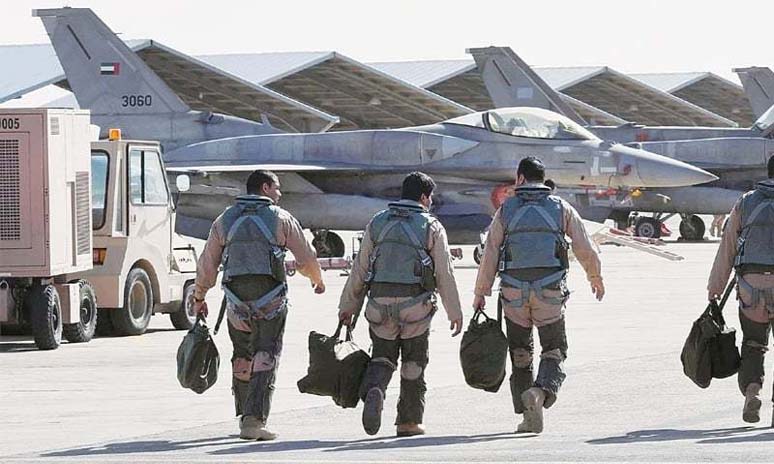
AFP, Dubai :
The United Arab Emirates on Tuesday launched air strikes from Jordan against the Islamic State group as an important Arab ally in the US-led anti-IS coalition returned to combat operations.
The raids came after President Bashar al-Assad said Damascus was being informed about air strikes against jihadists in Syria and that they could help his government if they were “more serious”.
Emirati F-16s that flew in to Jordan on Sunday carried out raids against IS, “hitting their targets and returning safely to base”, the UAE armed forces command said. It did not specify how many aircraft were in action, or where or what their targets were.
Following the December crash and capture of Jordanian F-16 pilot Maaz al-Kassasbeh, the UAE withdrew from the coalition’s strike missions over fears for the safety of its pilots.
The jihadists later killed the airman by burning him alive, releasing gruesome video footage of his “execution”.
Abu Dhabi wanted more done in terms of search and rescue for downed pilots in the conflict zones, the New York Times reported, and the US military later deployed aircraft and troops to northern Iraq to boost its SAR capabilities.
On Tuesday, the Pentagon said coalition aircraft carried out one air strike in eastern Syria in the 24 hours to 0600 GMT, and also pounded the jihadists in Iraq with 11 strikes.
The US-led coalition launched air strikes against IS in Syria on September 23, but has pointedly refused to coordinate with Damascus.
Meanwhile, US President Barack Obama will propose to Congress on Wednesday a new three-year authorization for the use of force against Islamic State with limits on US combat troops’ involvement, lawmakers and congressional aides said.
Obama has defended his authority to lead an international coalition against Islamic State since Aug 8 when US fighter jets began attacking the jihadists in Iraq. But he has faced criticism for failing to seek the backing of Congress, where some accuse him of breaching his constitutional authority.
Facing pressure to let lawmakers weigh in on an issue as important as the deployment of troops and chastened by elections that handed power in Congress to Republicans, he said in November he would request formal authorization for the use of military force (AUMF).
In an interview broadcast by the BBC on Tuesday, Assad confirmed that there was no cooperation with the coalition, members
of which he accused of backing “terrorism” – in an apparent reference to their support for other rebel groups fighting to overthrow him.
The United Arab Emirates on Tuesday launched air strikes from Jordan against the Islamic State group as an important Arab ally in the US-led anti-IS coalition returned to combat operations.
The raids came after President Bashar al-Assad said Damascus was being informed about air strikes against jihadists in Syria and that they could help his government if they were “more serious”.
Emirati F-16s that flew in to Jordan on Sunday carried out raids against IS, “hitting their targets and returning safely to base”, the UAE armed forces command said. It did not specify how many aircraft were in action, or where or what their targets were.
Following the December crash and capture of Jordanian F-16 pilot Maaz al-Kassasbeh, the UAE withdrew from the coalition’s strike missions over fears for the safety of its pilots.
The jihadists later killed the airman by burning him alive, releasing gruesome video footage of his “execution”.
Abu Dhabi wanted more done in terms of search and rescue for downed pilots in the conflict zones, the New York Times reported, and the US military later deployed aircraft and troops to northern Iraq to boost its SAR capabilities.
On Tuesday, the Pentagon said coalition aircraft carried out one air strike in eastern Syria in the 24 hours to 0600 GMT, and also pounded the jihadists in Iraq with 11 strikes.
The US-led coalition launched air strikes against IS in Syria on September 23, but has pointedly refused to coordinate with Damascus.
Meanwhile, US President Barack Obama will propose to Congress on Wednesday a new three-year authorization for the use of force against Islamic State with limits on US combat troops’ involvement, lawmakers and congressional aides said.
Obama has defended his authority to lead an international coalition against Islamic State since Aug 8 when US fighter jets began attacking the jihadists in Iraq. But he has faced criticism for failing to seek the backing of Congress, where some accuse him of breaching his constitutional authority.
Facing pressure to let lawmakers weigh in on an issue as important as the deployment of troops and chastened by elections that handed power in Congress to Republicans, he said in November he would request formal authorization for the use of military force (AUMF).
In an interview broadcast by the BBC on Tuesday, Assad confirmed that there was no cooperation with the coalition, members
of which he accused of backing “terrorism” – in an apparent reference to their support for other rebel groups fighting to overthrow him.

